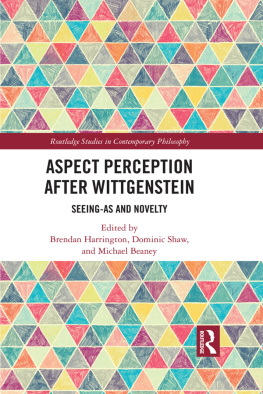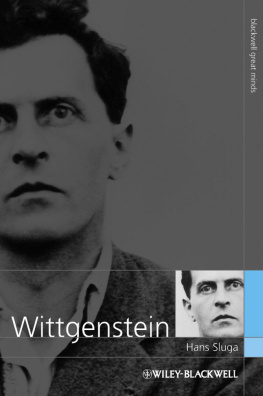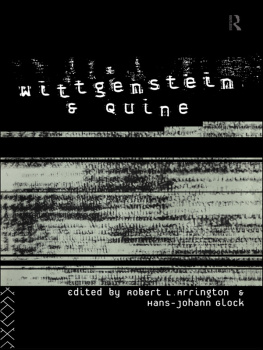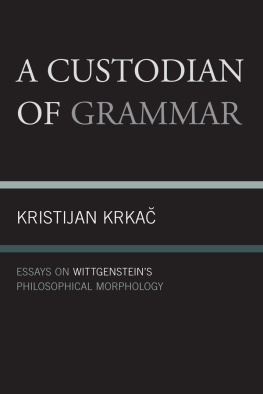Wittgenstein
Key Concepts
Key Concepts
Published
Theodor Adorno: Key Concepts
Edited by Deborah Cook
Pierre Bourdieu: Key Concepts
Edited by Michael Grenfell
Gilles Deleuze: Key Concepts
Edited by Charles J. Stivale
Martin Heidegger: Key Concepts
Edited by Bret W. Davis
Merleau-Ponty: Key Concepts
Edited by Rosalyn Diprose and Jack Reynolds
Wittgenstein: Key Concepts
Edited by Kelly Dean Jolley
Forthcoming
Alain Badiou: Key Concepts
Edited by A. J. Bartlett and Justin Clemens
Michel Foucault: Key Concepts
Edited by Dianna Taylor
Jrgen Habermas: Key Concepts
Edited by Barbara Fultner
Immanuel Kant: Key Concepts
Edited by Will Dudley and Kristina Engelhard
Jacques Rancire: Key Concepts
Edited by Jean-Philippe Deranty
First published in 2010 by Acumen
Published 2014 by Routledge
2 Park Square, Milton Park, Abingdon, Oxon OX14 4RN
711 Third Avenue, New York, NY 10017, USA
Routledge is an imprint of the Taylor & Francis Group, an informa business
Editorial matter and selection, 2010 Kelly Dean Jolley.
Individual contributions, the contributors.
This book is copyright under the Berne Convention.
No reproduction without permission.
All rights reserved. No part of this book may be reprinted or reproduced or utilised in any form or by any electronic, mechanical, or other means, now known or hereafter invented, including photocopying and recording, or in any information storage or retrieval system, without permission in writing from the publishers.
Notices
Practitioners and researchers must always rely on their own experience and knowledge in evaluating and using any information, methods, compounds, or experiments described herein. In using such information or methods they should be mindful of their own safety and the safety of others, including parties for whom they have a professional responsibility.
To the fullest extent of the law, neither the Publisher nor the authors, contributors, or editors, assume any liability for any injury and/or damage to persons or property as a matter of products liability, negligence or otherwise, or from any use or operation of any methods, products, instructions, or ideas contained in the material herein.
ISBN: 978-1-84465-188-7 (hardcover)
ISBN: 978-1-84465-189-4 (paperback)
British Library Cataloguing-in-Publication Data
A catalogue record for this book is available from the British Library.
Designed and typeset in Classical Garamond and Myriad.
Contents
Kelly Dean Jolley
Kelly Dean Jolley
Craig Fox
Lars Hertzberg
Craig Fox
Rupert Read
Roderick T. Long
Phil Hutchinson
Kelly Dean Jolley
Avrum Stroll
Avner Baz
Heather Gert
Rupert Read and Phil Hutchinson
Eric Loomis
Roderick T. Long and Kelly Dean Jolley
Arata Hamawaki
David H. Finkelstein
Avner Baz is Associate Professor of Philosophy at Tufts University, Medford, MA.
David H. Finkelstein is Associate Professor of Philosophy at the University of Chicago.
Craig Fox is Assistant Professor of Philosophy at California University of Pennsylvania.
Heather Gert is Associate Professor of Philosophy at the University of North Carolina at Greensboro.
Arata Hamawaki is Assistant Professor of Philosophy at Auburn University, AL.
Lars Hertzberg is Professor Emeritus of Philosophy at bo Akademi University, Turku, Finland.
Phil Hutchinson is Senior Lecturer in Philosophy at Manchester Metropolitan University, UK.
Kelly Dean Jolley is Professor of Philosophy at Auburn University, AL.
Roderick T. Long is Professor of Philosophy at Auburn University, AL.
Eric Loomis is Associate Professor of Philosophy at the University of South Alabama, Mobile, AL.
Rupert Read is Reader in Philosophy at the University of East Anglia, Norwich, UK.
Avrum Stroll is Research Professor of Philosophy at the University of California, San Diego.
| BB | The Blue and Brown Books (1958a; 1960; 1965) |
| BT | The Big Typescript (2005) |
| CV | Culture and Value (1980d) |
| LC | Lectures and Conversations on Aesthetics, Psychology and Religious Belief (1966; 1970) |
| L: C 193032 | Wittgensteins Lectures, Cambridge, 193032 (1989) |
| L: C 193235 | Wittgensteins Lectures: Cambridge, 19321935 (1980e; 2001b) |
| LWPP I | Last Writings on the Philosophy of Psychology, Volume I (1982) |
| LWPP II | Last Writings on the Philosophy of Psychology, Volume II (1992) |
| OC | On Certainty (1969) |
| PG | Philosophical Grammar (1978a) |
| PI | Philosophical lnvestigations (1953; 1958b; 2001a) |
| PO | Philosophical Occasions (1958c; 1993) |
| PR | Philosophical Remarks (1980a) |
| RFM | Remarks on the Foundations of Mathematics (1978b) |
| RPP I | Remarks on the Philosophy of Psychology, Volume I (1980b) |
| RPP II | Remarks on the Philosophy of Psychology, Volume II (1980c) |
| TLP | Tractatus Logico-Philosophicus ([1921] 1974) |
| Z | Zettel (1967; 1988) |
Kelly Dean Jolley
Biographical sketch
Ludwig Wittgenstein was born in 1889 to a wealthy and cultured Viennese family. He decided to study aeronautical engineering, and so went to Manchester University (England) in 1908. There, he became deeply interested in the philosophy of mathematics, and eventually in the works of Gottlob Frege. He met Frege, who advised him to go to Cambridge to study with Bertrand Russell. He did so in 1911. Wittgenstein studied in Cambridge from 1911 to 1913. When the First World War began, he joined the Austrian army, fought, and was taken captive in 1917. The war ended while he was interned. During the war years he drafted the Tractatus Logico-Philosophicus, and after the war the book was published in German and translated into English.
Around 1920, believing that he had in the Tractatus solved the problems of philosophy, he tried a variety of jobs gardener, teacher and architect. Finally, in 1929, he found himself again entangled in philosophical problems and he returned to Cambridge to work as a philosopher. Wittgenstein was dissatisfied in various ways with the Tractatus; the problems he had treated in it he was again puzzling over. For several years in Cambridge he worked feverishly to find new and better ways of thinking through those problems. He conducted famous and darkling seminars in which he worked out many of the ideas that would compose the Philosophical Investigations. He worked on that book for roughly twenty years, drafting and redrafting the remarks in it, as well as organizing and reorganizing them. He prepared to publish the book in 1945, but then withdrew the manuscript. The book was published posthumously in 1953. During his final years, Wittgenstein continued working in new ways on the problems that had gripped him from early in his career. He travelled to the United States and to Ireland, but returned to Cambridge, where he died of cancer in 1951.









